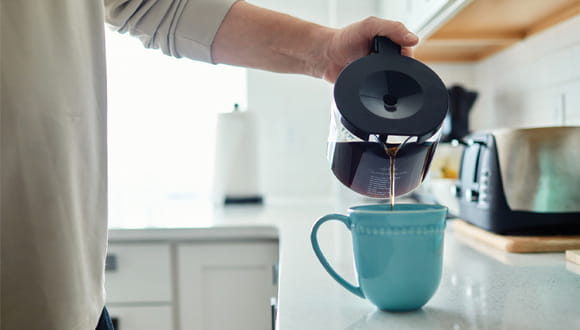Is There a Best Time to Drink Your Coffee In the Morning?
Jan. 19, 2024 - Katie McCallumEveryone has a preference for how they take their coffee. With cream and sugar or plain black. Iced or hot. First thing in the morning or just whenever you get to it.
Speaking of that first cup, does the timing of when you drink your coffee in the morning matter?
"There are many benefits to drinking coffee," says Knubian Gatlin, a wellness dietitian at Houston Methodist. "The caffeine content can help increase energy levels, alertness, improve cognitive function and enhance performance during physical activity. Additionally, one of the byproducts of caffeine, paraxanthine, plays a role in fat metabolism."
Research also suggests that coffee consumption is linked to a decreased risk of developing type 2 diabetes, possibly due to its antioxidant and anti-inflammatory properties. Other studies show it may help protect the liver by slowing the growth of scar tissue that can lead to fibrosis.
Coffee's ability to wake us up is what we tend to rely on the drink for the most. But is there such a thing as drinking it too soon after waking up? Could there be a "best time" for taking advantage of its active ingredient, caffeine?
How does caffeine affect the body?
Let's start by defining a few terms: adenosine and adenosine receptors.
"Adenosine is a molecule that plays a role in suppressing energy and arousal, making us naturally sleepy," explains Gatlin.
It does this by attaching to adenosine receptors, found throughout the body. Adenosine levels are lowest as you wake up, but they build throughout the day. As more adenosine attaches to its receptors, the interaction promotes a cascade of sleep-promoting effects.
"Caffeine blocks adenosine receptors, meaning adenosine can no longer attach to help promote sleepiness," says Gatlin. "Additionally, its mixture of vasoconstrictive and vasodilatory effects impact how nutrients are transported through our body, which promotes energy production."
In these ways, the caffeine in coffee keeps you awake and alert — and help to improve everything from cognitive to physical performance. But Gatlin says that's not all it does. The other effects of caffeine can actually work against feeling energized.
"Coffee is an appetite suppressant, meaning it can affect appropriate energy intake," adds Gatlin. "The caffeine in coffee can also act as a diuretic, which can lead to water loss via urination. If we're not rehydrating properly, even mild dehydration can impact our energy levels."
Lastly, caffeine can affect cortisol levels, a hormone that plays many important roles in your body.
The connection between caffeine and cortisol
Among the many effects of cortisol is the role it plays in the release of glucose, your body's primary source of energy. Cortisol levels naturally peak right after you wake up, and the resulting flood of glucose is used to create the energy you need to get going in the morning.
"Caffeine also increases cortisol levels," adds Gatlin. "This can help really wake us up, but it makes sense that, over time, your body might eventually adapt to produce less cortisol on its own if you drink a cup of coffee first thing every morning."
This may affect your sense of wakefulness, making it harder for you to feel energized at the start of the day — especially on one of those days when you don't get to have coffee right away.
Is there a best time to drink coffee?
Given how our body naturally wakes itself up and the various ways, both positive and negative, the caffeine in coffee can affect that, Gatlin doesn't suggest heading straight for the coffee in the morning.
"Although it helps wake us up, I often recommend waiting to have your first cup of coffee until about an hour or two after waking up," says Gatlin. "This allows your body to use its own resources for energy first."
Gatlin instead recommends starting the day with a tall glass of water and a balanced breakfast or snack. This helps rehydrate your body and set the tone for your energy usage throughout the rest of the day. It can also help prevent the discomfort that can sometimes occur from drinking coffee on an empty stomach.
"Caffeine tends to increase stomach acid and bile production, which can exacerbate symptoms of acid reflux," adds Gatlin.
On that note, know that it can also increase colon motility — which is why a trip to the bathroom often follows soon after that first cup of coffee. This might be a logistical factor to consider as you time your first cup.
"Lastly, be mindful about drinking coffee after about 3 p.m., since this can potentially impact your sleep cycle and make it harder to get restful sleep," adds Gatlin. "Distorted sleep patterns then impact your energy levels the next day."








